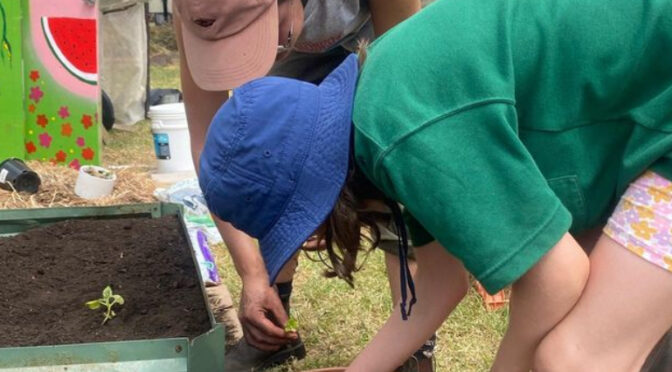CONTACT
Guerilla Gardening Naarm
Email guerillagardeningnaarm@proton.me
Instagram @guerillagardening_naarm
Facebook “Guerilla Gardening Naarm – Radicle Roots”
WEEKLY EVENTS
Saturdays at 10am – Working Bee
INDUCTIONS
The fastest way to become familiar with the Radicle Roots garden is to attend a Saturday working bee (10am every week) and receive an induction from a community member on-site. If you can’t make it on a Saturday, reach out to us via email or social media and we will find a time that works for you.
WORKING BEES
Working Bees happen every Saturday at 10am at the Radicle Roots Garden.
Working Bees are organised by ‘The Working Bee Coordination Group’; a group of garden community members who are committed to taking on the responsibility to facilitate the weekly working bees at the garden.
If you would like to join this group, chat to someone at the garden on a working bee day.
This group is open to anyone to join, who has the intention to help run the working bees. This group can have lots of people involved, with varying levels of commitment, as long as we are all willing to work together.
Anti social behaviour in this group will not be tolerated.
COMMUNICATION
WhatsApp is how our community members communicate day-to-day. Come to a Saturday working bee or get in touch via email/social media to be added to our group chat.
Facebook and Instagram are where you can find events held at the garden
WATERING
We have two methods for watering:
Manual watering with hoses and watering cans available to use. You can come along to one of our Saturday working bees to get inducted in using and storing the hoses – or get in touch if you can’t make a Saturday!
Irrigated watering has been setup with timers, please come to a working bee to get inducted into how it works. There should be a watering guide with pictures at the garden to explain how to water with the irrigated system.
PLANTING
The garden is a community project – collaborative input is how the garden operates. If you are keen to get involved in planting crops, please come along to one of our Saturday working bees and chat with the community members about what you want to plant as we are trying to nurture our soil and create a rotational planting system.
HARVESTING
You are welcome to harvest produce! Going forward, we would like to co-create a system that allows us to better share produce with those who struggle to access fresh food normally.
COMPOSTING
We currently use two composting systems – cold compost and bokashi
Cold compost
- Food scraps can go in here; just make sure you avoid onion, garlic, citrus, meat, bread and cooked meals.
- The compost should have an equal amount of carbon matter to food scraps – we like to have some sort of carbon-rich material like sugar cane mulch on-hand in the storage cabinet beside the compost for this. Come along to one of our Saturday working bees to get inducted in our composting systems.
- The compost should be watered and turned (induction required for this) once a week.
Bokashi
- Food scraps can go in here; just make sure you avoid onion, garlic, citrus, meat, bread and cooked meals.
- Bokashi grain is added to the organic matter in layers. This is stored in the storage cabinet beside the compost (induction required for access). This provides bacteria to ferment the organic matter.
- When the bokashi barrel is full, we leave it to break down for 2-3 weeks.
- Then, the mixture is shovelled into beds and left for 2-3 weeks before anything is planted.
WORMS
– We also have a worm farm!
- Please feed the worms when you bring compost down to the garden, things they cant have include: onion, garlic, citrus, meat, bread and cooked meals.
- Please keep the removable mat that covers the worms moist by giving it a little water when dry.
FERTILISERS AND NUTRIENTS
Manure
- We are experimenting with manure. Composted chicken and cow manure is what we have used so far.
Worm Tea
- Worm juice is contributed from neighbours
- This should be diluted at least 10 parts water to 1 part worm juice but we have been diluting a lot more (around 1/3 cup of worm juice in a 9L watering can)
Seasol
- Available for use in storage box (induction required). Follow directions on bottle.
PESTS & FUNGI
We are an Organic Garden – we do not use non-organic pesticides, fertilisers or fungicides.
Aphids
- We have been spraying plants that have lots of aphids with diluted eco oil. You can find this in the storage chest (induction required)
STORAGE
There are two storage units at the garden – the ‘watermelon cabinet’ and the blue box. These can be accessed when inducted into the garden.
